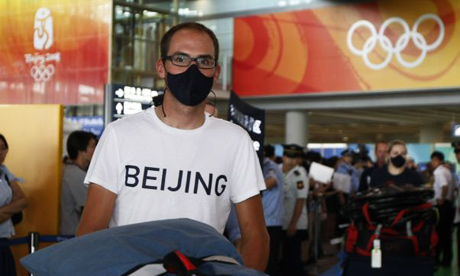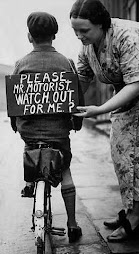 A US Olympic cyclist arrives in Beijing. Officials may relocate endurance
A US Olympic cyclist arrives in Beijing. Officials may relocate enduranceevents if smog levels become dangerous. Photograph: Yves Herman/ Reuters
Four American cyclists who arrived in Beijing airport wearing facemasks to protect against air pollution have apologised to the Beijing Olympics Organising Committee (Bocog) for any offence they have caused. The athletes, world keirin champion Jennie Reed among them, were said simply to have been overly concerned about the extent of the air-pollution problem.
"They have written letters of apology to Bocog," said the United States Olympic Committee chairman Jim Scherr, "and they now understand that it wasn't in the best judgement." It was made clear that the athletes had not been forced to apologise, but had done so of their own volition "upon realising how what they'd done had been perceived by the host nation".
Wearing masks through the airport was certainly over the top, but then two of the athletes even wore them on the plane. "Why we wore the masks is simple: pollution," Mike Friedman, another of the masked athletes, told the New York Times. "When you train your whole life for something, dot all your i's and cross all your t's, why wouldn't you be better safe than sorry? They have pollution in Los Angeles, and if the Olympics were in Los Angeles, we would probably wear these masks, too."
When pressed, the USOC confirmed that they had actually issued the athletes with the masks "at the request of the national governing bodies". Around 200 of the USA's athletes are believed to have brought a mask with them. "We're not chastising anybody for wearing a mask," Scherr continued, "and we would not forbid athletes [from wearing masks] if they felt it was in their best interests to do so."
Given that the USOC reiterated the line that Reed and her fellow cyclists were simply being too cautious in their desire to protect their lungs and maintain a competitive edge over their rivals, it seems the athletes did believe it was in their best interest. However erroneous their decision was - Beijing airport is pristine - it seems that in this case the desire to be diplomatic has overcome the athlete's wishes.
"Obviously we have to balance their right to do what they want with how those actions are perceived," Scherr said. "You never want to go to someone's house and cause embarrassment, and in this case I think they did."










No comments:
Post a Comment